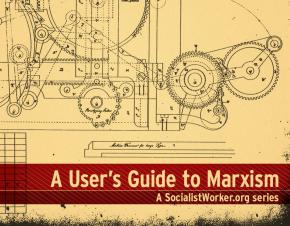Why are there still famines?
How can hunger persist in a world of enormous wealth and technological advances? explains how Marxists identify the capitalist system as the root cause.
THE UNITED Nations reports that the world is currently facing the most profound humanitarian crisis since the end of the Second World War in 1945.
At this very moment, more than 20 million people stand on the brink of starvation in regions of the Middle East and Africa. And this is to say nothing of the close to 800 million people in the world who are undernourished due to a lack of access to food.
The specific crisis that the UN is warning about is centered in four countries: Yemen, South Sudan, Somalia and the northeastern region of Nigeria.
One thread connecting these countries is conflict--all are gripped by civil warfare, but with the U.S. and other imperialist powers contributing to the violence.
In the case of Yemen, the U.S. is participating in a brutal war led by Saudi Arabia against Houthi rebels. According to the UN, in the past two years, more than 16,000 people have died in the conflict, many of them civilians killed by Saudi air strikes.
But hunger threatens to be an even bigger killer--UN officials say the number of Yemenis who don't know where their next meal will come from has increased by 3 million in just the past three months.
The UN is pleading for $4.4 billion in order to combat the worst of the hunger in the four countries, but this figure is less than one-tenth of the increase in U.S. military spending that Donald Trump just demanded in his first budget as president. Indeed, even before that massive increase, the U.S. government could provide all of the $4.4 billion for three-quarters of 1 percent of the current military budget.
But even this understates the obscenity of what's happening on the ground in Yemen: This misallocated spending on the military is directly implicated in the killing of Yemenis, whether by U.S. drone attacks or support for Saudi Arabia's air war.
SO WAR and violence are the proximate causes of the worst cases of hunger today, but this doesn't get to the heart of the matter. Undernourishment and hunger are worldwide problems of immense proportions that stubbornly persist, year after year, even in the face of rapid technological and economic growth. What explains this alarming fact?
You might think that the problem is one of physical scarcity: There's simply "too many" people on the planet and not enough food to feed everyone around the globe.

But the truth is that there is actually a surplus of food. Humanity produces far more food every year than everyone on the planet needs to survive. Because of modern technologies and economies of scale in agriculture, food production and storage, more calories per person are produced today than ever before in human history.
And yet millions stand on the brink of starvation or suffer from undernourishment or food insecurity. From a humanitarian or ethical standpoint, the solution to famine couldn't be simpler: Immediately transfer the surplus food that already exists to the people who need it most to save their lives.
Why doesn't this happen? Simply put: Because capitalism.
Profitability is what makes the wheels of the world economic system turn--and in many cases, it's more profitable to withhold or even destroy surplus food than to give it to those in need.
So long as food is treated as a commodity like any other, it will be produced and distributed according to market forces that tether food production and distribution to profit-based criteria and nothing else. What seems irrational at a macro level--destroying food when so many are hungry--in fact makes perfect sense from the perspective of the profit-seeking capitalist, competing in the marketplace.
Numerous examples illustrate this point. For instance, last October, the U.S. dairy industry dumped--that is, it destroyed--43 million gallons of "excess" milk.
Now, from a socialist point of view, there is no such thing as "excess" milk--nor any other basic commodity like it--so long as there is at least one person who needs it. But for the profit-seeking dairy industry, dumping milk made good business sense. From the perspective of profitability, there was a "glut" on the market that drove down milk prices and squeezed profits.
Seen in this way--through the lens of capitalism--destroying supply in order to prop up prices made perfect sense. At no time did the people who desperately need milk to survive register as significant, because profitability is what system responds to, not human need.
There are other more disturbing examples to show how run-of-the-mill capitalist economic activity leads to starvation and undernourishment.
Take, for instance, the 2007-08 global food crisis, when food prices soared to their highest levels in more than 150 years. What happened? As Alan Maass wrote for SocialistWorker.org: "Goldman Sachs happened."
The mega-bank encouraged a speculative frenzy in financial markets that gamble on the direction of prices of basic commodities, including food. Thus, Goldman helped drive up food prices to obscene levels in a short period of time--creating spectacular wealth for a few, and misery for millions of people who suddenly couldn't afford to feed themselves.
As food journalist Frederick Kaufman summarized at the time, "Bankers had taken control of the world's food, money chased money, and a billion people went hungry."
THERE'S SOMETHING tragic about famine under capitalism that wouldn't have been the case in earlier periods of human history.
The tragedy lies not simply in the fact--horrific though it is--that people starve or go undernourished. In most cases in the distant past, if human beings starved, it was probably because of physical scarcity. There simply wasn't enough food to go around.
But that is never true under capitalism, because the productive power of modern technology means that it is possible to produce far more food than all people need to survive without working ourselves to death doing it.
The tragedy peculiar to capitalism consists is this: Modern technology makes it possible, for the first time in human history, to produce more than enough food to feed everyone--yet because of the capitalist system's obsession with profit, that productive power to satisfy unmet needs lies idle and underutilized, resulting in unnecessary misery and death.
To use Karl Marx's terminology, the productive forces--the technologies, tools and techniques human beings use to produce goods and services--have grown at an unprecedented rate during the last several centuries of capitalist development. Physical scarcity is a thing of the past--today, we have the technological and productive power to easily meet the needs of everyone on the planet.
But capitalist social relations--in particular, private ownership of the productive forces by profit-seeking capitalists--prevent humanity from using that productive power for liberatory ends.
The Marxist philosopher G.A. Cohen puts the point like this:
The productive technology of advanced capitalism begets an unparalleled opportunity of lifting the curse of Adam and liberating human beings from toil and want, but the production relations of capitalist economic organization prevent the opportunity from being realized. The economic form most able to relieve toil is least disposed to do so...Capitalism brings humanity to the threshold of abundance and locks the door.
Marx defines social revolution as a way of casting off the fetters of capitalist social relations and allowing humanity to use the productive power of modern technology to improve quality of life and reduce unnecessary toil for all. Such a revolution would therefore, in Leon Trotsky's words, involve the "forcible entrance of the masses into the realm of rulership over their own destiny."
In other words, socialism is about allowing humanity to decide democratically how to make use of the enormous liberatory potential--thus far, largely unrealized--of modern productive technology.
Think of the radical implications that this building block of Marxism would have for problems like famine.
Famine occurs under capitalism because decisions about the production and allocation of food are made by shortsighted capitalists all competing against one another for profit. The people affected by those decisions have no authority to take part in them.
Neither do the interests of those most affected show up as significant in the decision-making of capitalist firms. The discipline imposed by market competition forces each capitalist to focus only on their bottom line. Thus, corporations are more likely to dump "excess" food than to distribute it to those in need.
But imagine how different things would be if the mass of people had the collective authority to decide how to use the tremendous productive powers of modern technology. Imagine if they had a say in how food would be produced and distributed. Imagine that they had the power and standing in the world order to make sure their interests are attended to and their wishes respected.
That, in a nutshell, is the ideal of socialism: ordinary working people democratically controlling the productive power of society and using it for the benefit of all.



